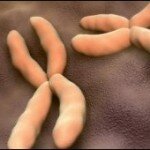BBC NEWS 10/5/09 -
This year’s Nobel prize for medicine goes to three US-based researchers who discovered how the body protects the chromosomes housing vital genetic code.
Elizabeth Blackburn, Carol Greider and Jack Szostak jointly share the award.
Their work revealed how the chromosomes can be copied and has helped further our understanding on human ageing, cancer and stem cells.
The answer lies at the ends of the chromosomes – the telomeres – and in an enzyme that forms them – telomerase.
The 46 chromosomes contain our genome written in the code of life – DNA.
When a cell is about to divide, the DNA molecules, housed on two strands, are copied.
But scientists had been baffled by an anomaly.
For one of the two DNA strands, a problem exists in that the very end of the strand cannot be copied.
Protecting the code of life
Therefore, the chromosomes should be shortened every time a cell divides – but in fact that is not usually the case.
If the telomeres did repeatedly shorten, cells would rapidly age.
“The discoveries … have added a new dimension to our understanding of the cell, shed light on disease mechanisms, and stimulated the development of potential new therapies”
The Nobel Assembly
Conversely, if the telomere length is maintained, the cell would have eternal life, which could also be problematic. This happens in the case of cancer cells.
This year’s prize winners solved the conundrum when they discovered how the telomere functions and found the enzyme that copies it.
Elizabeth Blackburn, of the University of California, San Francisco, and Jack Szostak, of Harvard Medical School, discovered that a unique DNA sequence in the telomeres protects the chromosomes from degradation.
Joined by Johns Hopkins University’s Carol Greider, then a graduate student, Blackburn started to investigate how the teleomeres themselves were made and the pair went on to discover telomerase – the enzyme that enables DNA polymerases to copy the entire length of the chromosome without missing the very end portion.
Their research has led others to hunt for new ways to cure cancer.
It is hoped that cancer might be treated by eradicating telomerase. Several studies are under way in this area, including clinical trials evaluating vaccines directed against cells with elevated telomerase activity.
Some inherited diseases are now known to be caused by telomerase defects, including certain forms of anaemia in which there is insufficient cell divisions in the stem cells of the bone marrow.
The Nobel Assembly at Sweden’s Karolinska Institute, which awarded the prize, said: “The discoveries… have added a new dimension to our understanding of the cell, shed light on disease mechanisms, and stimulated the development of potential new therapies.”
Carol Greider, now 48, said she was phoned in the early hours with the news that she had won.
She said: “It’s really very thrilling, it’s something you can’t expect.”
Elizabeth Blackburn, now 60, shared her excitement, saying: “Prizes are always a nice thing. It doesn’t change the research per se, of course, but it’s lovely to have the recognition and share it with Carol Greider and Jack Szostak.”
Professor Roger Reddel of the Children’s Medical Research Institute in Sydney, Australia, said: “The telomerase story is an outstanding illustration of the value of basic research.”
Sir Leszek Borysiewicz, chief executive of the Medical Research Council, said: “The Medical Research Council extends its congratulations to Blackburn, Greider and Szostak on winning the 2009 Nobel Prize.
“Their research on chromosomes helped lay the foundations of future work on cancer, stem cells and even human ageing, research areas that continue to be of huge importance to the scientists MRC funds and to the many people who will ultimately benefit from the discoveries they make.”
No related posts.
Related posts brought to you by Yet Another Related Posts Plugin.










We are waiting for Africa to win the Nobel in Medicine or will it never happen? Only one person from South Africa working in the USA won the Nobel before. But this was more than years ago. I do not think we can even compete with the so called developed world in term of technology and science. Our african turn might never happen. Congrats to the Blackburn team. You merit it. Eagerly waiting for the African Nobel in Medicine, Physics, Chemistry etc…
congratulations to the Dr. Blackburn, I hope her associates follow in her path. If Africa knows where her priorities are, no doubt will we have a Nobel Prize of Medicine before the end of the century.